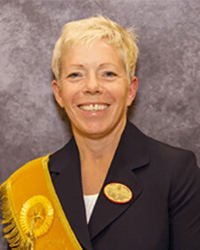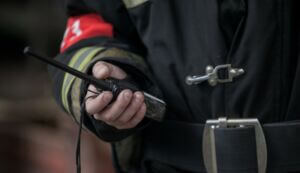NATIONAL GRANGE NEWS
Op Ed: Public Safety Does Not End at the City Limits
 By Christine E. Hamp, President of the National Grange
By Christine E. Hamp, President of the National Grange
Five years ago, the Bertschi Road Fire burned in Klickitat County in rural Washington state. The terrain was unforgiving, the flames unpredictable, and the first responders faced the added danger of having little to no cellular coverage. Communication was spotty at best, and without it, coordination can collapse, putting lives in danger.
But then, FirstNet made the difference. Crews deployed a Satellite Cell on Light Truck – a portable cell tower built specifically for first responders – and suddenly they had the lifeline they needed. That connection enabled firefighters to communicate with each other, share information, and ultimately contain and extinguish the fire.
I can’t help but wonder: What if they hadn’t had that tool? What if the fire burned unchecked because responders couldn’t connect? The story could have ended in tragedy.
This is why Congress must reauthorize FirstNet – because it is the only nationwide public safety network designed by first responders, for first responders. When every second counts, there is no substitute.
Rural communities are all too familiar with this reality. Emergencies don’t stop at the city limits – and neither should public safety. When disasters strike in small towns, on farms or in remote canyons, families deserve the same protection as those in downtown neighborhoods.
FirstNet ensures that happens. It gives police, firefighters and emergency medical services secure, prioritized communications when commercial networks are overwhelmed or down. It provides
deployable assets – trucks, drones and portable towers – that can be on the ground within hours. It even delivers coverage in places where cell service has never reached before. That’s not just progress; that’s lifesaving infrastructure.
 I spent more than 30 years in public safety and local government, including several years on Type 1 and Type 3 incident management teams in northeast Washington and the Pacific Northwest. I have seen firsthand what happens when communication fails – and what happens when FirstNet succeeds. It has transformed emergency response.
I spent more than 30 years in public safety and local government, including several years on Type 1 and Type 3 incident management teams in northeast Washington and the Pacific Northwest. I have seen firsthand what happens when communication fails – and what happens when FirstNet succeeds. It has transformed emergency response.
And it’s not just for “the big one.” From wildfires to tornadoes, search-and-rescue to active shooters, FirstNet is the backbone that lets responders talk, coordinate, and protect lives every day. It even
extends to utilities, transportation workers, and health care partners, because emergencies are never handled by one agency alone.
Here’s the bottom line: unless Congress acts, FirstNet’s authorization will expire in 2027. Walking away now would dismantle more than a decade of progress and put lives – especially rural lives – at
risk.
The Grange was founded on the principle of giving voice to rural America. Today, that means speaking with one voice to say: FirstNet works, and we cannot afford to lose it.
Congress must rise to the occasion. Public safety is not negotiable, and it must not end at the city limits.
